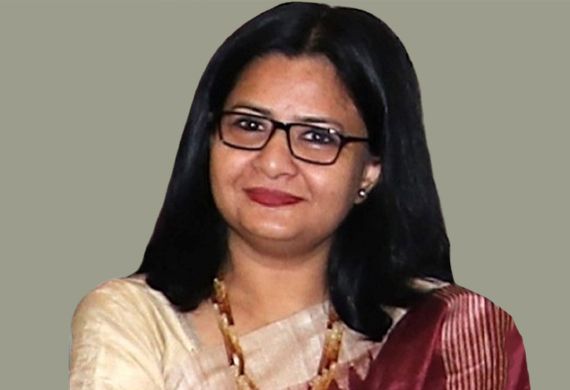
Sustainable Practices Driving Women's Entrepreneurship & Businesses
By: Rumi Mallick Mitra, Director of Corporate Responsibility, EY GDS
Rumi Mallick Mitra is the Global Head of Corporate Responsibility at EY Global Delivery Services, overseeing a strategy focused on operational sustainability and net-zero carbon emissions. With expertise in corporate responsibility and diversity, she previously led CSR at IBM and holds two Master's degrees from prestigious Indian institutions.
In an in-depth conversation with Women Entrepreneurs Review Magazine, Rumi shares her insights on how women-led businesses are increasingly leveraging sustainable practices to distinguish themselves in the market. She explores emerging trends, the evolving role of mentorship & sponsorship programs, highlighting successful models for integration. She also outlines strategies for scaling sustainable practices across diverse regions.
Given the increasing emphasis on sustainability, how are women-led businesses currently leveraging sustainable practices to differentiate themselves in the market? What are some emerging trends you see in this space?
According to the World Economic Forum, women-led businesses act as regenerative forces within their communities, hiring local workers, reducing poverty, and contributing to safer, greener environments. The World Bank reports that women-led enterprises drive innovation and diversity, leading to novel solutions and products.
EY Global Delivery Services (GDS) nurtures and supports women as leaders, entrepreneurs and innovators. We believe that when we enable women and girls to reach their potential, we can accelerate the pace of change, improving the lives of individuals and communities through better economic opportunities. We believe that women-led sustainable businesses can bring a differentiating value in the market, and over the years EY has supported women entrepreneurs across the world through its business as well as corporate responsibility interventions.
With the increasing discourse on carbon emissions reduction, clean energy consumption and transitioning to renewable energy sources, effective waste management, and enabling inclusive cultures, women-led businesses are prioritizing sustainable sourcing with a distinct focus on green products and services. Whether its consumer products, retail services, lifestyle, food and beverage, healthcare and personal care, businesses that were women led are showing a marked focus on eco-friendly products, making endeavours to green their supply chains, engage rural and underserved communities in product value chain, and consciously integrating circularity in their business.
How do you see mentorship and sponsorship programs evolving to support women entrepreneurs in adopting and integrating sustainable practices? Can you provide examples of successful models or frameworks?
The journey from an idea to a product to a business that makes profit while creating long-term value for the entrepreneur as well for its stakeholders and the environment requires timely knowledge and relevant ecosystem support. While women have made remarkable strides in all professions, the journey of entrepreneurship remains one of the most challenging, with women facing barriers specific to their gender.
Further, with the growing focus on sustainability, and with women entrepreneurs choosing ‘green’ as their market differentiator, it has become even more important to help women with necessary education and relevant knowledge that will help them to ideate and find solutions – integrating sustainability in their business.
At EY, the global Corporate Responsibility (CR) framework is based on our conviction that an organization can create long-term value in society and the environment if it’s able to leverage diverse resources, funds, people, and its technologies or products or services to enable solutions to key issues.
EY GDS promotes EY’s sustainability-focused skills accelerators and climate clinics that help to build knowledge on current trends and couples the learning with corporate mentorship via our vast network of technical and business experts. These programs empower girls and women to develop and explore innovative solutions with a sustainable mindset. Our collaborations with NGOs and employees enable women to embrace sustainable practices along their career or entrepreneurship ventures.
In what ways are collaborations between businesses, non-profits, and governmental bodies evolving to foster women’s entrepreneurship within the realm of sustainability? What innovative partnership models have shown promise?
Women have historically played a crucial role in sustainable thinking, often acting as key agents of change – whether it is through advocacy for conservation, water management or their daily actions that often involve sustainable practices that contribute to environmental conservation and resilience. As women are consistently choosing to standout in their business ideas by bringing new and innovative ways to solve multiple-interrelated challenges while creating a triple-bottom line business, they also require unique and purpose-based programs or initiatives that support their unique needs.
For example, women entrepreneurs gain confidence by learning from their peers and often share experiences that help refine their products and services, adding value for their customers. Like any business, accessing essential knowledge, market networks, and funding remains crucial for boosting their entrepreneurial journeys.
Several multi-stakeholder collaborations, anchored by government or business promotion platforms have helped to bring to the main stream the unique needs of women entrepreneurs with their specialised offerings. The NITI Aayog’s Women Entrepreneurship Platform (WEP), the TiE women network, FICCI Women entrepreneurship platform, for example are great collaborations, while many non-profits supported by corporate through their corporate responsibility programs are offering fellowships for women entrepreneurs, including helping them to access resources and funds via government schemes like the Mudra Yojana Scheme, Annapurna schemes and Start-up India funds. In the process, they are also increasing the use and relevant utilisation of these schemes.
What strategies are most effective for scaling sustainable practices in women-led businesses, particularly in regions where such practices are not yet mainstream? How can these strategies be adapted to different market conditions?
Scaling sustainable practices in women-led businesses, especially in regions with emerging sustainability awareness, requires a multi-faceted approach. As corporations develop a deeper understanding of the significance of women's roles—whether as board members, employees, suppliers, customers, or community members—there is a conscious effort to integrate women into the value chain.
The growing interest in women-led businesses, particularly those with a sustainability focus, has led companies to diversify their sourcing channels and intentionally onboard women-owned enterprises. Whether integrated as business strategies, responsible practices, or corporate responsibility initiatives, these efforts can be scaled effectively when tailored to market needs and geography-specific contexts. Such approaches have repeatedly demonstrated success in driving the growth and reach of women-run businesses.
EY, for example, not only sources from women-led businesses but also supports their growth by building their capacity, helping them deepen their sustainability efforts and strengthen market connections. In regions with low traction, governments, businesses and non-profits need to work together to prioritize capacity building, equipping entrepreneurs with the skills they need, and developing local networks and collaborations for resources, markets, and expertise. Additionally, these stakeholders can play a key role as initial buyers of services, providing the support needed for early-stage growth.
What are the potential future developments in the intersection of sustainability and women’s entrepreneurship? How should businesses and policymakers prepare to support and leverage these developments?
The convergence of sustainability and women's entrepreneurship holds great promise for growth. Emerging trends in green technology, circular economy practices, and sustainable finance are creating new opportunities for women-led businesses. The use of digital technologies in sustainability is also on the rise, with women entrepreneurs leading startups that leverage AI, blockchain, and IoT to develop more efficient and transparent sustainable solutions.
Meanwhile, the challenge of climate change has highlighted the critical role of women in strengthening traditional practices and embracing innovation, including adapting to livelihood changes in non-urban and remote regions. Recognizing the potential in these areas, governments and policymakers must take deliberate actions to support and capitalize on these developments.
I am confident that women entrepreneurs in sustainability business will echo Ayn Rand – “The question isn’t who’s going to let me; its who’s going to stop me.”
Most Viewed
- 1 Women's Health Startup HerMD Closing Doors Amid Industry Challenges
- 2 5 Famous Women in Indian Armed Forces
- 3 Saudi Women No longer Require Male Permission for Clothing Choices, says Prince MbS
- 4 Kolkata Medtech Startup Innovodigm Raises Rs 5.5 Crore Seed Funding Led by IAN Group
- 5 Yamunanagar's Kashish Kalra Honoured after Securing 111th Rank in UPSC Civil Services Exam
- 6 Madurai Appoints Its First Woman Corporation Head
- 7 IAS Vijayalakshmi Bidari Appointed as the new Nagpur Divisional Commissioner
- 8 American Entrepreneur Lucy Guo Overtakes T Swift to become Youngest Female Billionaire
- 9 ICC Women's World Cup 2025 Trophy Showcased at Indore's Holkar Stadium
- 10 Aparna Saxena's Beauty Venture AntiNorm Launches in India
- 11 Vidya Nataraj Co-Founded BlueStone Jewellery & Lifestyle files IPO
- 12 5 Women Freedom Fighters of India
- 13 Dr. G Krishnapriya appointed as CEO for Trichy
- 14 M3M & Sirona Partner to Introduce Menstrual Hygiene Vending Machines in 15 Locations
- 15 Punjab Govt launches SHE Cohort 3.0 Supporting Tech-led Women Startups
- 16 Indian origin Lawyer, Sweena Pannu appointed as the US New Superior Court Judge
- 17 The Aurora Tech Award recognizes 4 Indian Women-led Startups
- 18 Kerala's Republic Day parade featured an all-female tableau
- 19 Manisha Kabbur Becomes Karnataka's First Woman International Karate Coach
- 20 Director K. S. Ravikumar's Daughter Maalica Ravikumar Launches Life Coaching Company 'Evergrowth Academy' for Women
- 21 Leezu's Raises Pre-Seed Funding to Accelerate Growth in Sexual Wellness Industry
- 22 Sattu: Super-easy summer drink for PCOS gut healing
- 23 Swathi Nelabhatla creates Sitha App, India's First Women-Exclusive Gig Platform
- 24 7 Timeless Female Kathak Dancers & their Iconic Legacies
- 25 Meet 7 Iconic Women Architects of Modern India & their Most Impactful Work
- 26 This Woman-led Insuretech Startup is Helping Bridge the Education Financing Gap in India
- 27 Women Leaders Share Lessons Learnt from India Women's WC Win
- 28 5 Enterprising Women Founders Powering Singapore's Tech & Innovation Landscape
- 29 4 Women. 4 Stories. One Vision for Smarter, Stronger Healthcare
- 30 Global Gender Gap Narrows to 68.8%, But Full Equality 123 Years Away: WEF Report 2025
- 31 Changemakers: 7 Women Entrepreneurs Taking the Make in India Movement Forward
- 32 Meet Lucy Guo, The Youngest Self-Made Female Billionaire Disrupting Tech
- 33 How Women are Driving India's Festive Online Shopping Surge






